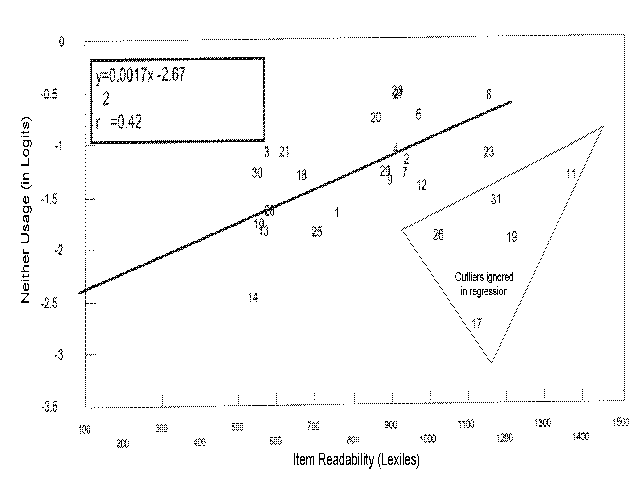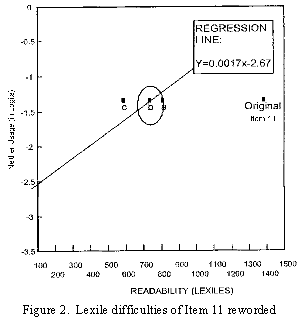
Figure 1. Middle category use vs. question readability.
In our enthusiasm to ask exactly the right question, we sometimes use too many words and tangled grammar. For instance, what did respondents really make of my Item 11, "My immediate manager effectively works with people who are different from him/her self (i.e., gender, race/ethnic background, lifestyle)"? Did a respondent wonder "Is my immediate manager my boss?" or "What is the lifestyle of my manager"? We may never know, but we can get some clues.
When our questions become wordy and convoluted, the reading load may overwhelm some of our respondents, causing them to retreat to a neutral response. In a recent questionnaire, the neutral, middle category was "neither agree nor disagree." I noticed that the more complicated the question, the more respondents chose this category. Figure 1 shows the trend. The x-axis is the readability of the item in Lexiles. The y-axis is the observed log-odds of choosing the neutral category. The regression line (omitting outliers) is shown. The outlier on the far right, at the average reading level of post-graduates (RMT 10:1, p. 473), is my item 11 above. The most readable items match 6th graders.
Let us take advantage of the regression line in Figure 1 to imagine what question it is more likely that respondents actually answered when confronted with an unreadable question. Figure 2 shows the lexile location of 3 reasonable rewordings of Item 11.

Figure 1. Middle category use vs. question readability.

Option a drops the (..), "My immediate manager effectively works with people who are different from him. ..." This
version is still too complicated. Respondents disregarded our painstaking proviso!
Option b simplifies the grammar, "My immediate manager effectively works with people ... different from him."
Option b is on the regression line. We may surmise that, whatever our respondents understood the item to say, it
was only as complex as this.
Option c further simplifies the wording "My ... manager effectively works with people different from him." According to Figure 2, this has gone too far for the behavior exhibited this time. It seems these respondents were able to embrace the word "immediate". But, since a further objective is to increase the proportion of informative responses to our items, we will learn from option c and other, even simpler, rewordings of this item how to write better questionaires.
Winnie Lopez,
International Survey Research LLC.
For further research, see: John T. Kulas and Alicia A. Stachowski, "Middle category endorsement in odd-numbered Likert response scales: Associated item characteristics, cognitive demands, and preferred meanings", Journal of Research in Personality, Volume 43, Issue 3, June 2009, Pages 489-493
"The great inquiry relates to that which is essential rather than to that which is accidental. Of course that which is
accidental has to come into the inquiry. Certain things have been written, certain places and times had been
specifically indicated, and therefore attention must be directed into those quarters. Still the grave and everlasting
inquiry relates to that which is essential and immutable."
Joseph Parker (London, ca. 1890)
What are they answering? Lopez, W. … Rasch Measurement Transactions, 1999, 13:1 p. 682
| Forum | Rasch Measurement Forum to discuss any Rasch-related topic |
Go to Top of Page
Go to index of all Rasch Measurement Transactions
AERA members: Join the Rasch Measurement SIG and receive the printed version of RMT
Some back issues of RMT are available as bound volumes
Subscribe to Journal of Applied Measurement
Go to Institute for Objective Measurement Home Page. The Rasch Measurement SIG (AERA) thanks the Institute for Objective Measurement for inviting the publication of Rasch Measurement Transactions on the Institute's website, www.rasch.org.
| Coming Rasch-related Events | |
|---|---|
| Jan. 16 - Feb. 13, 2025, Fri.-Fri. | On-line workshop: Rasch Measurement - Core Topics (E. Smith, Winsteps), www.statistics.com |
| Apr. 8 - Apr. 11, 2026, Wed.-Sat. | National Council for Measurement in Education - Los Angeles, CA, ncme.org/events/2026-annual-meeting |
| Apr. 8 - Apr. 12, 2026, Wed.-Sun. | American Educational Research Association - Los Angeles, CA, www.aera.net/AERA2026 |
| May. 15 - June 12, 2026, Fri.-Fri. | On-line workshop: Rasch Measurement - Core Topics (E. Smith, Winsteps), www.statistics.com |
| June 19 - July 25, 2026, Fri.-Sat. | On-line workshop: Rasch Measurement - Further Topics (E. Smith, Winsteps), www.statistics.com |
The URL of this page is www.rasch.org/rmt/rmt131d.htm
Website: www.rasch.org/rmt/contents.htm